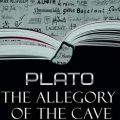 The Allegory of the Cave
The Allegory of the Cave
Автор: Платон
Год издания: 0000
The Allegory of the Cave, or Plato's Cave, was presented by the Greek philosopher Plato in his work Republic (514a–520a) to compare «the effect of education (???????) and the lack of it on our nature». It is written as a dialogue between Plato's brother Glaucon and his mentor Socrates, narrated by the latter. The allegory is presented after the analogy of the sun (508b–509c) and the analogy of the divided line (509d–511e). All three are characterized in relation to dialectic at the end of Books VII and VIII (531d–534e). Plato has Socrates describe a group of people who have lived chained to the wall of a cave all of their lives, facing a blank wall. The people watch shadows projected on the wall from objects passing in front of a fire behind them, and give names to these shadows. The shadows are the prisoners' reality.
 The Persistence of Allegory
The Persistence of Allegory
Автор: Jane K. Brown
Год издания:
In an impressively comparative work, Jane K. Brown explores the tension in European drama between allegory and neoclassicism from the sixteenth through the nineteenth century. Imitation of nature is generally thought to triumph over religious allegory in the Elizabethan and French classical theater, a shift attributable to the recovery of Aristotle's Poetics in the Renaissance. But if Aristotle's terminology was rapidly assimilated, Brown demonstrates that change in dramatic practice took place only gradually and partially and that allegory was never fully cast off the stage. The book traces a complex history of neoclassicism in which new allegorical forms flourish and older ones are constantly revitalized. Brown reveals the allegorical survivals in the works of such major figures as Shakespeare, Calderón, Racine, Vondel, Metastasio, Goethe, and Wagner and reads tragedy, comedy, masque, opera, and school drama together rather than as separate developments. Throughout, she draws illuminating parallels to modes of representation in the visual arts. A work of broad interest to scholars, teachers, and students of theatrical form, The Persistence of Allegory presents a fundamental rethinking of the history of European drama.
 Allegory and Ideology
Allegory and Ideology
Автор: Fredric Jameson
Год издания:
Fredric Jameson takes on the allegorical form Works do not have meanings, they soak up meanings: a work is a machine for libidinal investments (including the political kind). It is a process that sorts incommensurabilities and registers contradictions (which is not the same as solving them!) The inevitable and welcome conflict of interpretations – a discursive, ideological struggle – therefore needs to be supplemented by an account of this simultaneous processing of multiple meanings, rather than an abandonment to liberal pluralisms and tolerant (or intolerant) relativisms. This is not a book about «method,» but it does propose a dialectic capable of holding together in one breath the heterogeneities that reflect our biological individualities, our submersion in collective history and class struggle, and our alienation to a disembodied new world of information and abstraction. Eschewing the arid secularities of philosophy, Walter Benjamin once recommended the alternative of the rich figurality of an older theology; in that spirit we here return to the antiquated Ptolemaic systems of ancient allegory and its multiple levels (a proposal first sketched out in The Political Unconscious); it is tested against the epic complexities of the overtly allegorical works of Dante, Spenser and the Goethe of Faust II, as well as symphonic form in music, and the structure of the novel, postmodern as well as Third-World: about which a notorious essay on National Allegory is here reprinted with a theoretical commentary; and an allegorical history of emotion is meanwhile rehearsed from its contemporary, geopolitical context.
 Allegory in Early Greek Philosophy
Allegory in Early Greek Philosophy
Автор: Jennifer Lobo Meeks
Год издания:
Allegory in Early Greek Philosophy examines the role that allegory plays in Greek thought, particularly in the transition from the mythic tradition of the archaic poets to the philosophical traditions of the Presocratics and Plato. It explores how a mode of speech that «says one thing, but means another» is integral to philosophy, which otherwise seeks to achieve clarity and precision in its discourse. By providing the early Greek thinkers with a way of defending and appropriating the poetic wisdom of their predecessors, allegory enables philosophy to locate and recover its own origins in the mythic tradition. Allegory allows philosophy simultaneously to move beyond mythos and express the whole in terms of logos, a rational account in which reality is represented in a more abstract and universal way than myth allows.